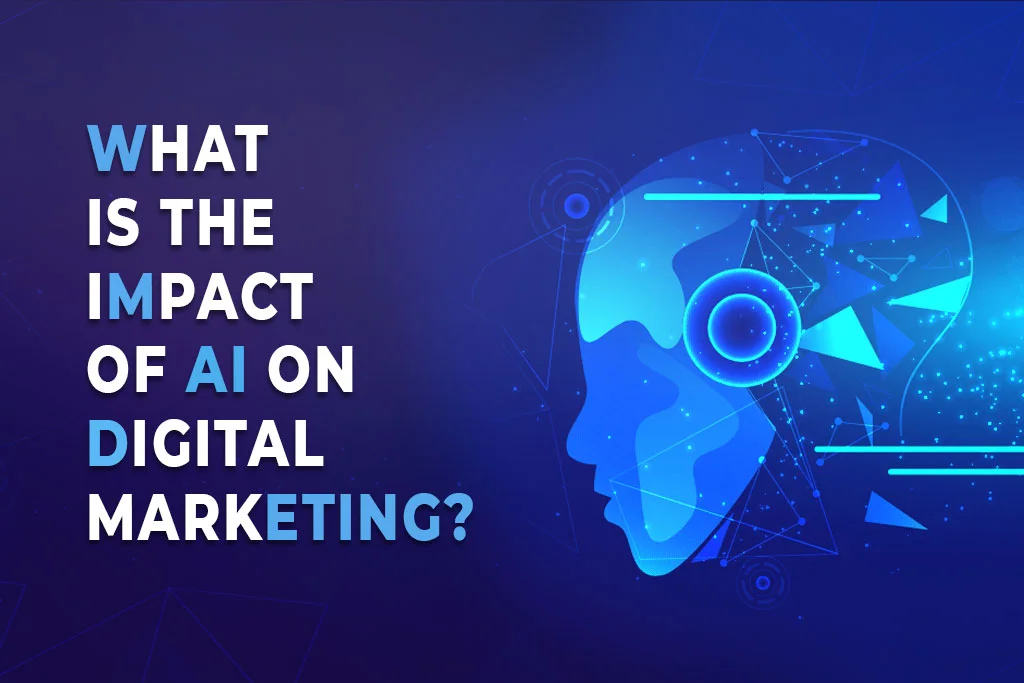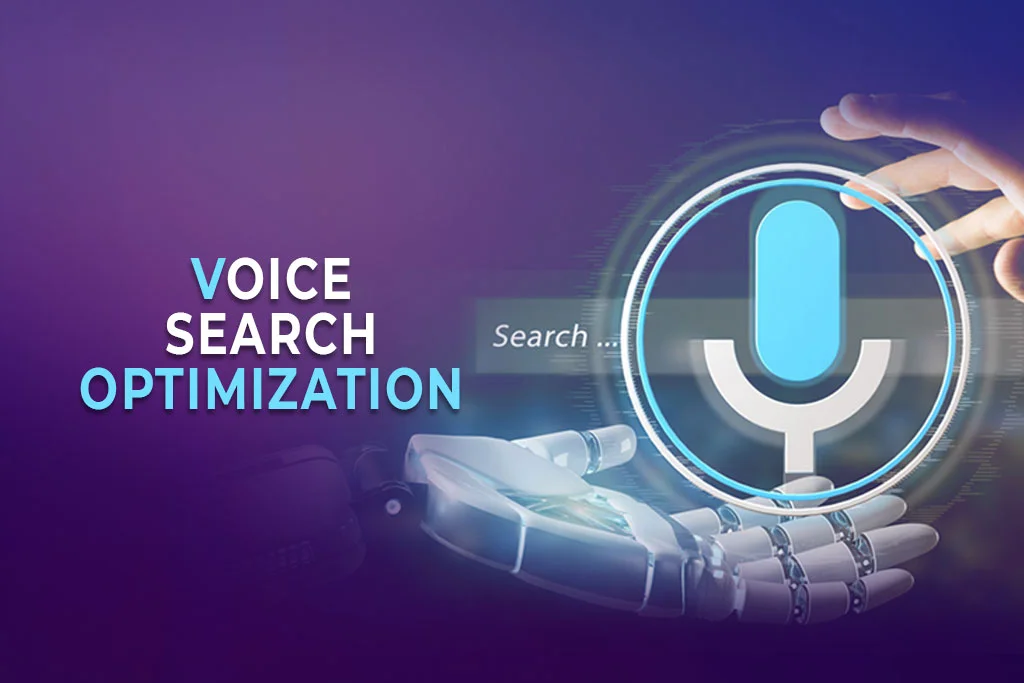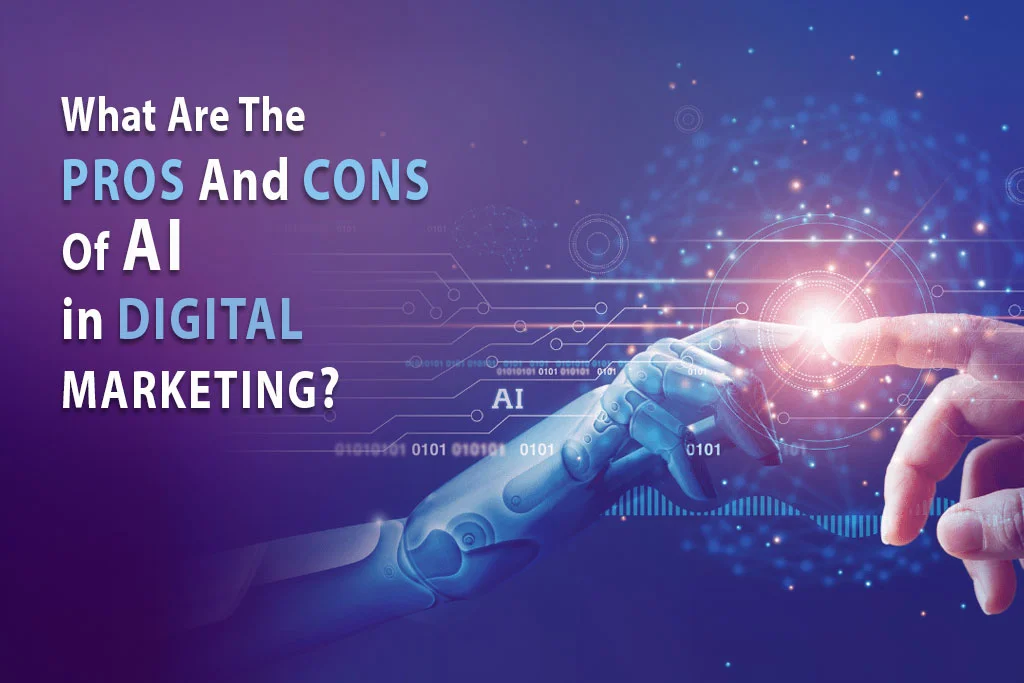What is The Impact of AI on Digital Marketing?

Do you want to know the impact of AI on digital marketing? You are at the right place. Artificial intelligence is having a significant impact on digital marketing. It is changing the way businesses communicate with their customers, personalizing marketing strategies, and boosting social media presence.
It is a valuable tool that allows companies to analyze large amounts of data in real-time. AI is improving the way businesses perform market research and make business choices. It is important to note that artificial intelligence should not be considered as an alternative for marketers. Artificial intelligence also helps them improve and optimize their strategies.
Artificial intelligence is a valuable technology for digital marketing. It creates opportunities to enhance the client experience and increase business efficiency. In this blog, we are going to discuss the impacts of AI on digital marketing and what are the pros and cons of AI on digital marketing.
What Is AI In Digital Marketing?
AI in digital marketing uses modern technologies, like data collection, language understanding, and machine learning. It collects insights and manages marketing tasks. This means that marketers may change material for customers depending on their behaviors and preferences. It makes interactions more relevant and engaging. AI helps us to quickly assess huge amounts of data. It allows us to better understand client behavior and customize it to their requirements. Artificial intelligence is highly beneficial. It is important to remember that human skills remain essential. Humans use artificial intelligence to make decisions and develop strategies that engage with customers.
The Impact Of AI on Digital Marketing:
AI acts as a specific digital assistant. It enhances marketing effectiveness by understanding customer preferences. Its progress guarantees long-term growth in digital marketing. AI is a useful secret weapon in today’s fast-paced digital market. Here, we are discussing the impacts of digital marketing and these are the best AI tools in digital marketing:
AI-Powered Data Analysis:
AI uses huge data to analyze client demands, identify actions, and make quick judgments. It’s crucial for enhancing products, strategies, and campaigns in today’s dynamic world.
Artificial intelligence can help digital marketers make better data-driven decisions in the following ways:
1. Predictive analytics insights help to improve product development and user experience.
2. It analyzes user behavior and generates unique, brand-loyal content.
3. AI-powered predictive analytics provides a better knowledge of customer needs. It increases satisfaction and loyalty.
4. It detects user patterns, which improves ad targeting and conversion rates.
5. Machine learning believes in client behavior. It helps to improve marketing tactics and budget allocation.
Personalized Customer Experience:
Personalized experiences create stronger connections with customers. It increased engagement and drove higher conversion rates. The result is a more efficient and effective marketing strategy that increases consumer satisfaction and loyalty.
AI has transformed marketing by providing enhanced customer experiences. Here’s how:
1. AI analyzes huge amounts of client data to gain important insights into their preferences, actions, and needs.
2. AI algorithms are constantly learning and adapting based on customer interactions and feedback. It allows marketers to improve their targeting strategies over time.
3. Marketers can better categorize their audience. They establish targeted marketing campaigns based on specific audience segments.
4. AI personalised experiences from messages to the whole consumer journey. It offers recommendations, unique product suggestions, and specific services.
AI Chatbots:
AI-powered chatbots play an important role in supporting digital marketing campaigns. They offer personalized customer support, collecting data for lead generation and analysis. Artificial intelligence also enhances engagement and customer satisfaction.
Here’s how digital marketing campaigns benefit from AI chatbots:
Enhance Customer Service:
Chatbots provide 24/7 support. They reduce the workload on support teams and improve satisfaction and loyalty.
Increase Engagement:
It engages with users. It increases interaction and time spent on websites or social media platforms.
Offer Personalized Recommendations:
AI-powered chatbots recommend products and offer personalized suggestions. They give discounts or promotions based on user behavior and preferences.
Collect Leads:
Chatbots gather email addresses and phone numbers for lead generation and marketing purposes.
Analyze User Data:
Chatbots analyze user data to identify trends and insights. It improves marketing campaigns and targeting strategies.
Chatbots react to around 90% of client queries in ten messages or less. It reduces tasks and increases user experience. They contribute to artificial intelligence marketing trends:
1. AI personas
2. Natural Language Understanding
3. Conversational commerce
4. Integration with voice assistants
AI-Generated Content:
AI-generated content simplifies digital marketing by reducing time, improving quality, and increasing campaign performance. AI Tools generate blog and social media material based on data and user preferences. It shortens efforts and enhances effects.
Here’s how digital marketing campaigns benefit from AI-powered content generation tools:
1. AI can customize content based on user behavior. It ensures a tailored experience for each customer. Chatbots use AI to personalize responses based on a user’s previous experiences with the brand.
2. AI uses performance data to optimize content, like headlines and pictures, to increase engagement and conversion rates.
3. AI-powered tools edit and proofread content for grammar and spelling errors. They ensure high-quality and professional output.
4. AI-powered tools efficiently create product descriptions, blog posts, and social media content. It reduces the need for human input.
AI-Powered Marketing Automation:
AI-powered marketing automation tools streamline email, social media, and data analysis tasks. They free up time for strategic and creative objects.
These tools offer numerous benefits for digital marketing campaigns:
1. They use machine learning algorithms and analyze user data to estimate conversion potential. They allow marketers to focus their efforts on promising leads.
2. Real-time campaign optimization systems actively alter ad bids or email content based on user behavior. It increases campaign success.
3. Its lead rating systems assign scores to leads based on conversion potential, It allows for effective use of resources and prioritized follow-up techniques.
AI-Powered Fraud Detection:
AI algorithms detect and prevent fraud by analyzing data in real-time. They assign fraud reviews and use statistical analysis to quickly detect abnormalities. It protects organizations and customers from financial losses.
These algorithms help you to prevent fraud and account hacking through various methods:
1. AI detects odd patterns, like repeat clicks from the same IP address or unexpected rises in account activity.
2. Machine learning algorithms predict fraud trends based on variables, IP addresses, locations, and device types.
3. AI systems examine chat logs and email communications to detect fraud-related keywords and phrases.
4. It monitors accounts in real-time and notifies owners of uncertain activity, such as accessing an account from a different location.
5. AI systems assign scores to transactions or activities based on their potential for fraud. They allow firms to prioritize responses and use resources more effectively.
Voice Search Optimization:

Voice search optimization has changed customer behavior. It demands AI-powered digital marketing methods. Natural language processing technologies enable marketers to personalize content for voice requests. They guarantee brand visibility and accessibility on voice-activated devices, which is critical for addressing user needs.
These patterns have resulted in many significant innovations:
Voice-First Content:
You should create content that is specifically designed for voice interactions to ensure validity and value.
Conversational Keywords:
Conversational Keywords optimize content to look like natural speech patterns in voice requests.
Speech Commerce:
Speech commerce simplifies online buying by allowing clients to order and pay with communication commands. It improves comfort and accessibility.
Localized Voice Search:
Localized Voice Search aims to optimize information for location-based queries. It provides benefits to local companies and SEO.
Voice Assistants Integration:
We optimize marketing techniques for voice-activated virtual assistants, such as Siri and Alexa, to engage consumers.
Reduced Costs For Marketing Agencies:
The use of AI marketing solutions has resulted in significant cost reductions for marketing organizations by providing automation and efficiency.
1. The routine functions such as content marketing, ad placement, and data analysis are automated. It reduces the need for human resources and saves time and money.
2. Data-driven insights help agencies optimize campaigns and tactics. It reduces costly mistakes and enhances overall success.
3. Scalability and flexibility enable agencies to handle higher workloads without paying major costs or operational overhead.
4. Improved targeting and personalization result in higher ROI by delivering more relevant and targeted marketing messages. It increases customer engagement and conversion rates.
AI-Based Image/Video Recognition:
AI-driven solutions help organizations optimize their visual content strategy. It shows the results of more effective marketing campaigns and more brand engagement. AI-powered image and video recognition systems provide various advantages for organizations when developing engaging visual content:
1. AI algorithms can accurately analyze and categorize visual content. AI makes it easier for businesses to find specific images and videos quickly. This simplifies the content search process, saving time and effort.
2. Artificial intelligence can detect patterns and trends in design, style, and user engagement by analyzing a great deal of visual content. This data helps businesses to design attractive images that connect with their target audience.
3. AI systems automatically assign relevant keywords and tags to images and videos based on their content. This simplifies content organization and enhances searchability. It ensures businesses can simply identify and access graphics as needed.
4. AI algorithms can analyze trends and user preferences to suggest new visual content ideas. This helps businesses remain bright as well as appealing by providing new and timely pictures that capture their audience’s attention.
What Are The Pros And Cons Of AI In Digital Marketing?

Artificial intelligence has both pros and cons, but it also presents challenges and moral issues. It addresses issues about data privacy, bias, and injustice. As artificial intelligence advances in numerous sectors, these factors must be properly addressed.
Pros Of AI In Digital Marketing:
Utilizing artificial intelligence in marketing offers several pros:
1. Routine duties such as data entry and responding to customer requests are automated. It frees up time for more valuable activities.
2. AI automates a variety of jobs. It allows marketers to focus on advanced goals.
3. AI-powered solutions simplify content generation and optimization, resulting in consistent, high-quality material across all digital channels.
4. AI-powered data analysis avoids guessing. They offer actionable insights to help refine marketing strategy and identify new opportunities.
5. Predictive analytics analyzes customer behavior. They allow for focused marketing activities that improve user experience and provide higher returns on investment.
6. AI algorithms use previous data to predict customer behavior and industry trends. They allow for more accurate and effective planning.
7. By checking data from customers, AI provides personalized recommendations and content that improves the customer experience and engagement.
8. Routine processes like data analysis, client division, and email handling are automated. It results in increased operational efficiency and productivity.
Cons Of AI In Digital Marketing:
If AI in Digital marketing has different pros, then it also has some cons in a digital world:
1. Ethical questions are raised about user data privacy, permission, and the ethical usage of AI-generated content.
2. AI systems frequently require access to sensitive data. It needs strong security measures to prevent breaches and illegal access.
3. Errors in data or algorithmic judgments might lead to incorrect analysis and potentially negative business effects.
4. AI systems may maintain biases in the data they are trained on, causing accidental prejudice or unfair treatment.
5. The questions related to the availability and validity of AI-generated content, including plagiarism and property rights, must be addressed.
Conclusion:
The improvements in artificial intelligence are moving the digital marketing business forward. AI allows firms to better target customers with specific messaging, which leads to increased sales. Additionally, AI delivers useful insights into customer behavior. It improves traditional advertising methods. AI allows organizations to remain competitive in today’s dynamic world by simplifying activities such as content generation and optimization.
As technology advances, organizations must adjust their marketing strategy to stay relevant and competitive. You can take help from MediaEclips, an experienced digital marketing agency in Plano, TX. In case of any information, you can make a consultation call with us.
FAQs:
Artificial intelligence has changed digital marketing by allowing for targeted messaging. It optimizes advertising methods and offers important insights into customer behavior. It shows results in increased engagement and ROI.
AI will significantly impact digital marketing by enhancing personalization and automating tasks. It provides valuable insights for more effective targeting and campaign optimization.
AI is crucial in marketing because it enables businesses to automate tasks. It analyzes vast amounts of data for insights, personalised customer experiences, and optimizes campaigns for better results. It also enhances efficiency and drives growth.
AI’s function in digital marketing is to automate operations, analyze data for insights, and personalize customer experiences. It optimizes campaigns and improves overall efficiency and effectiveness.

